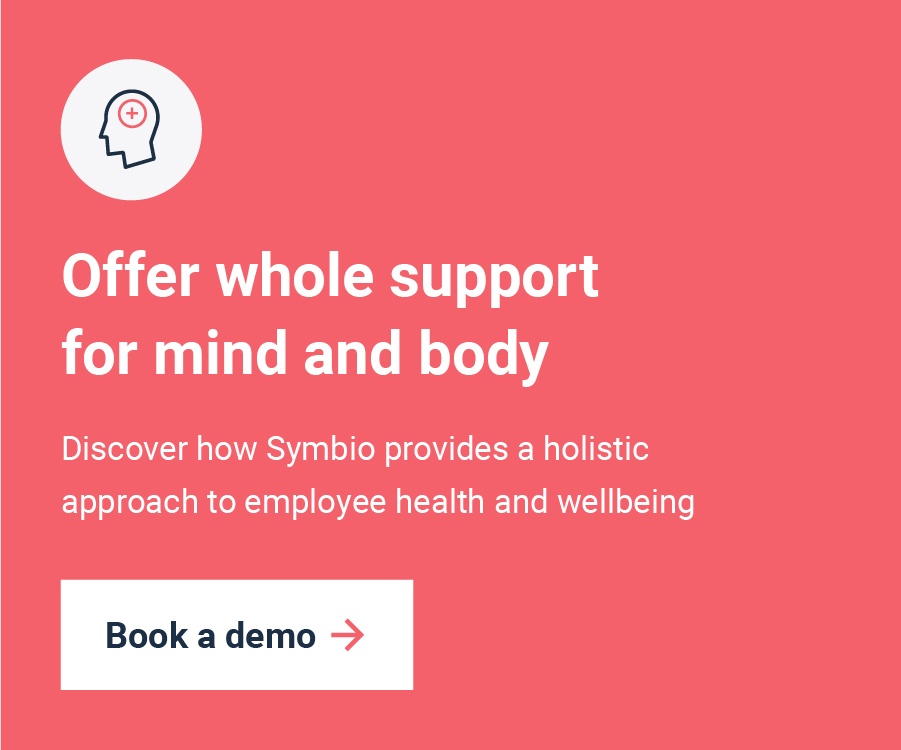According to the World Health Organisation, 12 billion working days are lost to depression and anxiety worldwide.
If you want to bolster your bottom line and have a happy, healthy workforce you should invest in improving mental health in the workplace.
This blog will explore the six signs that your employee is experiencing mental health issues and how you can support them.
What are the signs of mental health issues at work?
Research suggests that one in six workers in the UK are experiencing mental health issues at any one time. Here are the tell-tale signs that your team could be struggling and need help.
1. Lack of social engagement
If a once bubbly, enthusiastic and friendly employee starts to withdraw and become less engaged they could be struggling. Especially if they used to always attend social events and chat with their co-workers.
2. Low Performance
Mistakes happen. After all, you can’t be perfect all the time. However, if you notice an employee’s performance slipping it may be a sign of mental health issues. Monitor their performance over time, and note if they miss deadlines or neglect essential tasks.
3. Irritability
Irritability is a common symptom of anxiety and depression. This can manifest itself in heightened sensitivity to criticism, lashing out at colleagues and general rudeness. It’s important to approach your employee with compassion and empathy. Otherwise, you risk increasing their stress, making things worse.
4. Fatigue
Fatigue and a loss of energy are some of the physical symptoms of anxiety and depression. If an employee is consistently exhausted or struggling to focus they may not be sleeping due to workplace stress.
5. Substance Misuse
If an employee is struggling, they may turn to substance misuse to cope. If you suspect an employee of abusing alcohol or drugs approach the matter sensitively and confidentially.
Signs of substance misuse include:
- Unexplained or frequent absences
- Behavioural changes
- Unexplained dips in productivity
- More mistakes, accidents and ‘near-misses’
- Performance or conduct issues
6. Increased Absences
When facing a mental health challenge, an employee may take time off to try to address and handle the issue. Watch out for a surge in employee absences or sick leave.
The business cost of employee mental health issues
A recent study by Deloitte found that mental health issues cost UK employers around £42 - 45 billion a year. It also found that focusing on and investing in the mental well-being of your workforce generates £5 for every £1 spent.
So, with a 500 percent return on investment, it’s time to start thinking about how you can help improve the mental health of your workforce.
How to improve mental health in the workplace
Understanding how to support employees experiencing mental health issues is fundamental to maintaining a productive workforce. In fact, addressing wellbeing at work can lead to a 12 percent increase in productivity.
Here are three things you can do right now to improve mental health in the workplace:
1. Learn to listen
When it comes to your employees’ mental health, it’s not enough to hear them out. You need to actively listen. To do so, you need to cultivate an environment that lets workers raise their concerns without fear of judgement or repercussion.
You can do this by:
- Training managers in active listening. This is listening with all senses and allows your managers to give employees their fullest attention.
- Appointing a mental health champion. This is an employee trained to promote good mental health in the workplace. Ideally, this should be a person who has a strong commitment and interest in mental health. They should also be a good communicator and have strong interpersonal skills.
Creating an empathetic and understanding culture is vital to ensuring employee wellbeing. Which, in turn, leads to better business outcomes, such as significantly increased productivity.
2. Destigmatise the topic of mental health
Despite the increased understanding of mental health in society, there is still a stigma around talking about it in the workplace.
In fact, only 14 percent of employees say they are comfortable talking about mental illness at work. This is in comparison to the 42 percent of workers that feel they could talk about physical conditions.
Help your workforce feel at ease by becoming a mental health ally during Mental Health Awareness Week. Or simply hold open discussions on mental health.
Invite your employees to share their experiences and foster an understanding of how mental health can affect their lives. This will help them feel at ease to seek support, voice their concerns and reduce the impact of poor mental health on their personal and professional lives.
3. Provide support through a health and wellbeing app
If you want to provide mental health support to your workforce at scale you should consider a health and wellbeing app. This can be an invaluable tool for managing mental health. But, in a crowded market, how can you tell which is right for your business?
When choosing a health and wellbeing app, make sure it has these features:
- Personalisation. Your chosen app should provide personalised pathways that can address your employees’ individual health needs. By directing employees to relevant resources, advice and information you help them feel better, faster.
- Counselling services. Access to verified and experienced professionals can make all the difference to an employee grappling with mental health issues. Ensure any app has an easy and accessible booking system for mental health counselling.
- Confidentiality and privacy. Any employee health app should prioritise user privacy and security. Your employees should be confident that the app will handle their personal information and mental health concerns with respect and discretion.
All of the above means that your employees will be able to take charge of their mental health and seek professional help when necessary.
Next steps: adopt a whole health approach to mental health
In this blog, we’ve focussed on how you can spot the signs of employee mental health issues and how you can help them.
But, to create truly healthy, happy and resilient teams you need to also consider their physical wellbeing. After all, there is a clear link between physical health and mental health.
This is where Symbio, our holistic health and wellbeing solution, can help. It provides employee access to both mental and physical health services whenever they need them.
If you want to find out how you can improve the overall health of your workforce book a demo today.






